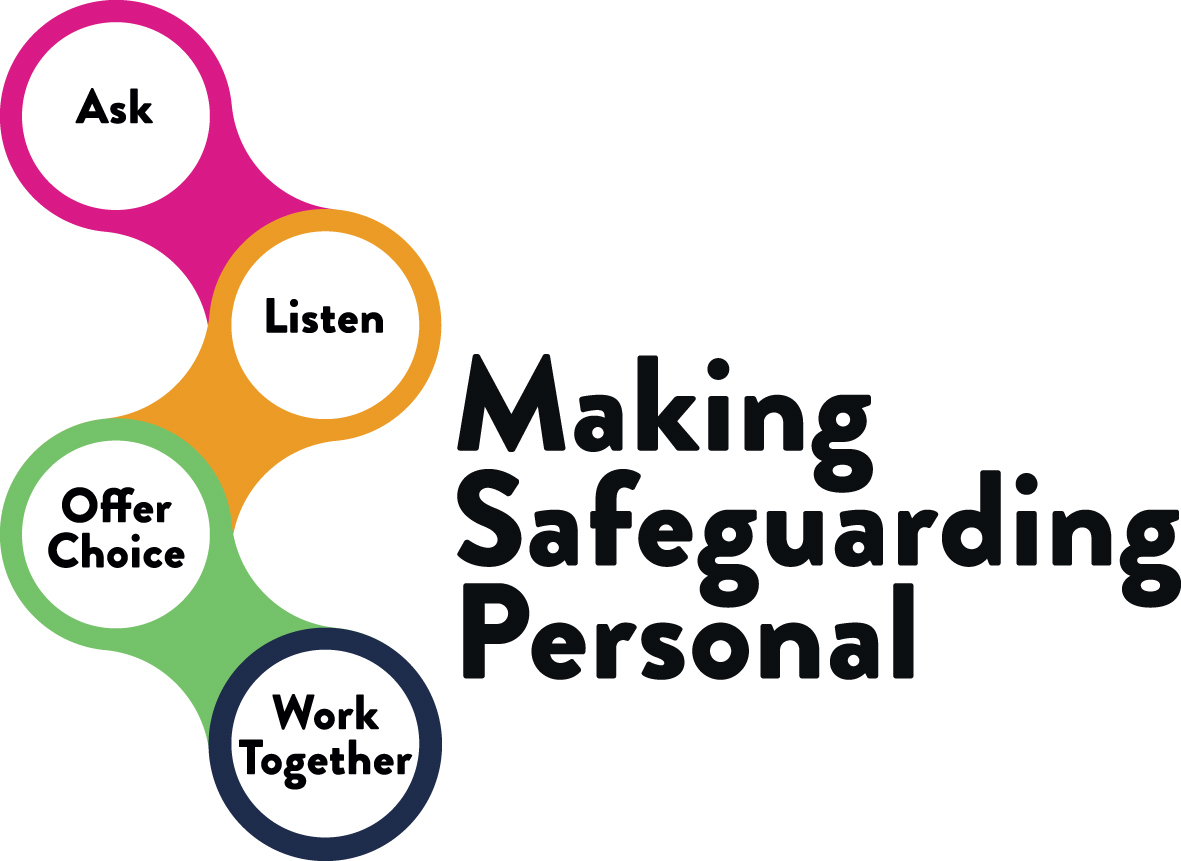The following four points are designed to be used at all stages in the safeguarding process, from identification of a concern through to closure.
Ask
- understand the situation from the person's perspective and gather the facts using a strength’s-based approach
- what are their views and wishes?
- what are they worried about?
- what do they want to happen? What outcomes would the person like to achieve?
- what's working well? Discuss the person's strengths and what helps them to be safe
- what needs to happen next?
Listen
- listen carefully to what they are saying
- consider how the person usually communicates and any tools that may assist them in this
- give the person time and space to share what they feel is important information
- listen with empathy and respect and without judgement
- try to record what the person is saying in their own words
- pay attention to non-verbal communication
Offer choice
- empower them to make their own choices
- consider the person's capacity to make relevant decisions, when they may need support with this, and who can provide this support
- ask who they would like to be involved?
- be open and honest about when consent is needed and when action may be taken without consent
- be clear about what safeguarding is, who will be involved and what information will be shared with who
- be honest about what can be achieved
Work together
- build and maintain a positive relationship with the person and work in partnership with them to achieve their desired outcomes
- ensure the enquiry is conducted at the person's pace
- establish how the person, or their advocate, wants to be involved and agree how this will be achieved
- share information with the person at every stage and check what they would like to happen next at every stage
- as the enquiry progresses, assist the person to review risks and rethink the outcomes if required
- discuss and agree when the outcomes have been met as far as possible and confirm when safeguarding support will end
- feedback, did we meet their desired outcome?
Making Safeguarding Personal (MSP) sits firmly within the Department of Health (DH) Care and Support Statutory Guidance and revised in 2021 to support the Care Act (2014).
It means safeguarding adults:
- is person-led
- is outcome-focused
- engages the person and enhances involvement, choice and control
- improves quality of life, wellbeing and safety (paragraph 14.15)
Making Safeguarding Personal must not simply be seen in the context of a formal safeguarding enquiry (Care Act, 2014, Section 42 enquiry2), but also in the whole spectrum of safeguarding activity.
MSP is a shift in culture and practice in response to what we now know about what makes safeguarding more or less effective from the perspective of the person being safeguarded.
It is about having conversations with people about how we might respond in safeguarding situations in a way that enhances involvement, choice and control as well as improving quality of life, wellbeing and safety.
It is about seeing people as experts in their own lives and working alongside them and their family or advocate. It is about collecting information about the extent to which this shift has a positive impact on people’s lives. It is a shift from a process supported by conversations to a series of conversations supported by a process.
How has this been implemented in Lincolnshire?
In Lincolnshire the Safeguarding Adults Board (LSAB) is striving to develop a safeguarding culture that focuses on the personalised outcomes desired by people with care and support needs who may have been abused or at risk of abuse. Making safeguarding personal forms part of the LSAB strategy.
Embed the making safeguarding personal approach within all partner agencies
The Making Safeguarding Personal (MSP) approach, puts service users' at the centre of everything we do, follows the edict of ‘no decision about me without me’, and means that the person, their families and carers must work together with agencies to find the right solutions to keep people safe and support them in making informed choices.
Moving forward, we now want to drive a cultural shift in all partner organisations that will embed the principles of MSP into their structures, processes and practice.
The key focus is on developing a real understanding of what people wish to achieve, agreeing, negotiating and recording their desired outcomes, working out with them, their family or advocates how best those outcomes might be realised and then checking at the end how far their expectations have been met.
How will this safeguard adults with care and support needs?
Making Safeguarding Personal is not about putting the individual through a process it is about having a conversation with them or their representative to ask what has happened.
We will:
- ask if they require any immediate support to keep them safe
- explain how safeguarding works
- ask what they would like to happen and support them in a way to give them choice and control to improve their quality of life, wellbeing and safety
We promise to:
- listen to them
- understand their views and wishes
- take them seriously
- treat them with respect
- support them to feel as safe as they want
- support them to make their own decisions
- keep them informed and involved
- tell them what will happen next
An individual’s perspective
Where the principles of MSP are applied effectively, an individual would be able to agree with the following statements.
People worked together to reduce the risk to my safety and wellbeing;
- I had the information I needed, in the way that I needed it
- professionals helped me to plan ahead and manage the risks that were important to me
- people and services understood me - recognised and respected what I could do and what I needed help with
- the people I wanted were involved
- I had good quality care - I felt safe and in control
- when things started to go wrong, people around me noticed and acted early
People worked together and helped when I was harmed;
- people noticed and acted
- I felt listened to
- people asked what I wanted to happen and worked together with me to get it
- the people I wanted were involved,
- I got the help I needed by those in the best placed to give it
- the help I received made my situation better
- people will learn from my experience and use it to help others
- I understood the reasons when decisions were made that I didn’t agree with
Translating principles into outcomes
The Care Act 2014 reiterates the following six principles of safeguarding, which apply to all sectors and settings including:
- care and support services
- further education colleges
- commissioning, regulation and provision of health and care services
- social work
- healthcare
- welfare benefits
- housing
- wider local authority functions
- criminal justice system
The principles should inform the ways in which professionals and other staff work with adults. The principles can also help SABs, and organisations more widely, by using them to examine and improve their local arrangements.
Six key principles underpin all adult safeguarding work:
- Empowerment – people being supported and encouraged to make their own decisions and informed consent
“I am asked what I want as the outcomes from the safeguarding process, and these directly inform what happens.” - Prevention – it is better to take action before harm occurs
“I receive clear and simple information about what abuse is, how to recognise the signs and what I can do to seek help.” - Proportionality – the least intrusive response appropriate to the risk presented
“I am sure that the professionals will work in my interest, as I see them and they will only get involved as much as needed.” - Protection – support and representation for those in greatest need
“I get help and support to report abuse and neglect. I get help so that I am able to take part in the safeguarding process to the extent to which I want.” - Partnership – local solutions through services working with their communities, communities have a part to play in preventing, detecting and reporting neglect and abuse
“I know that staff treat any personal and sensitive information in confidence, only sharing what is helpful and necessary. I am confident that professionals will work together and with me to get the best result for me.” - Accountability – accountability and transparency in delivering safeguarding
“I understand the role of everyone involved in my life and so do they.”
In addition to these principles, it is also important that all safeguarding partners take a broad community approach to establishing safeguarding arrangements. It is vital that all organisations recognise that adult safeguarding arrangements are there to protect individuals.
We all have different preferences, histories, circumstances and life-styles, so it is unhelpful to prescribe a process that must be followed whenever a concern is raised.
Making Safeguarding Personal means it should be person-led and outcome-focused. It engages the person in a conversation about how best to respond to their safeguarding situation in a way that enhances involvement, choice and control as well as improving quality of life, wellbeing and safety.
Nevertheless, there are key issues that local authorities and their partners should consider if they suspect or are made aware of abuse or neglect.
Some people may express desired outcomes or wishes that are not possible, and this provides opportunities for frank discussion to establish what the next best option is within some broader boundaries and principles that they have stated.
For other people their desired outcomes may not be possible for instance if they don’t want the police involved but the person who has abused or neglected them is in a position to do the same to others. Again there will be opportunities to explain this honestly and to find ways to most closely meet their wishes.
Assurance programme
As part of the LSAB assurance process, MSP is featured as key topic for assurance.
In early 2020 a multi-agency MSP case file audit was undertaken. The aim of the audit was to give a snap shot of the use of MSP in safeguarding practice across agencies, and included cases where partner agencies held responsibility for undertaking the Section 42 safeguarding enquiry.
Audits were completed according to an audit tool, split into four sections:
- pre safeguarding concern
- safeguarding concern form
- safeguarding enquiry
- closure
Auditors were asked to answer questions within each section by providing supporting and opposing evidence sourced from Mosaic; and then make an overall judgement from 1 to 10 (1: limited or no aspects of good practice, 10: excellent MSP practice) for each section, resulting in a possible four scores for each case audited.
Scores were reviewed and presented in a report to both the LSAB executive board and its partnership board for consideration with the report offering two key recommendations.
- the Board should revive its MSP promotion and promotional material and create a campaign of awareness across agencies and frontline staff
- the MSP audit undertaken in early 2020 should be repeated in 2021 and after the promotional campaign to establish if improvement has been made
- an LSAB training package was created around MSP available to all partners

